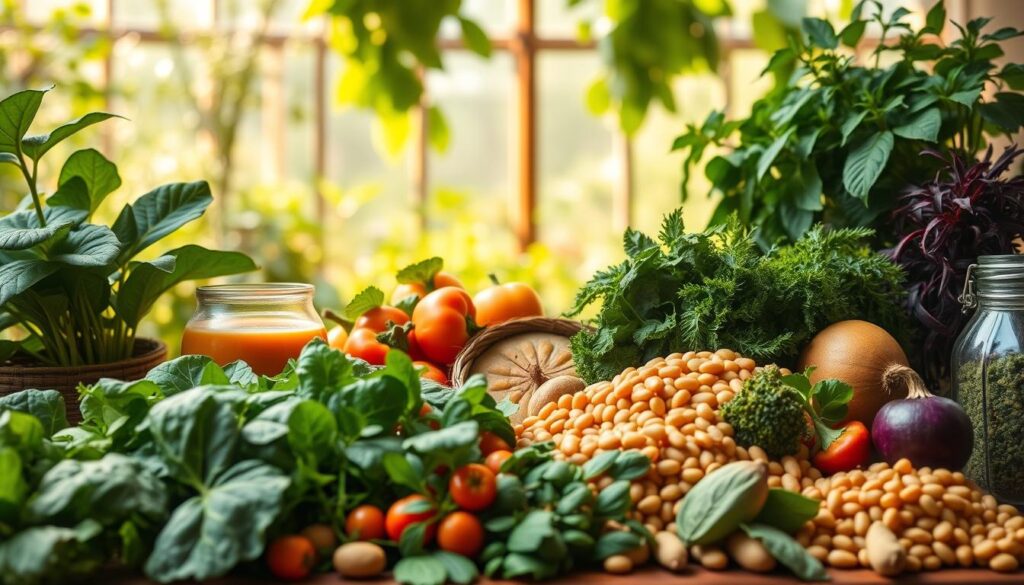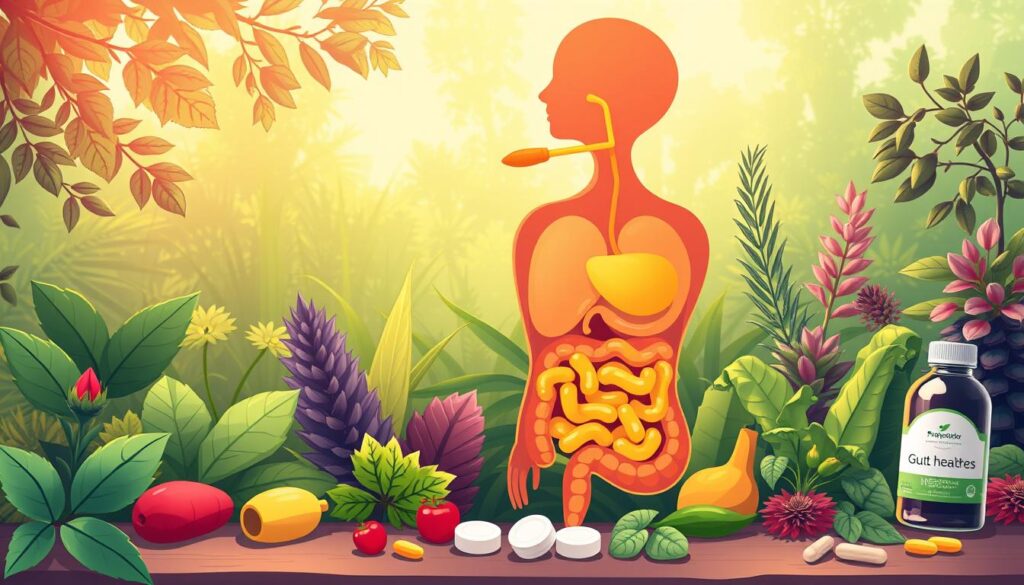Can a vegan diet help keep your gut healthy? Or do vegans need special strategies for a healthy gut? This question is key for those who eat plant based as gut health affects overall health.
A healthy gut is vital for digestion immune function, and even mental health.
Knowing how important gut health is helps us make better diet and lifestyle choices. As research finds more about gut health nutrition, and well being it’s clear we need a full plan to keep our guts healthy. This includes understanding the gut microbiome, common digestive problems and how to improve gut health.
Key Takeaways
- A healthy gut is essential for proper digestion, immune function, and mental well-being
- Vegans require specific strategies to maintain optimal gut health
- The gut microbiome plays a critical role in overall health
- Common digestive issues can be addressed through dietary and lifestyle changes
- A well-balanced vegan diet can support optimal gut health with the right approach
Understanding Gut Health Basics for Vegans
Gut health is key for those on a plant-based diet. It affects digestion, immune function, and even mental health. Restoring the balance of gut bacteria is important, as it can be upset by diet, stress, and toxins.
A balanced gut microbiome is vital for vegans. It helps break down plant nutrients and absorb vitamins and minerals. An imbalance can cause bloating constipation, and nutrient deficiencies. Vegans need to understand gut health basics to make good diet and lifestyle choices.
The Role of Gut Microbiome in Overall Health
The gut microbiome is full of trillions of microorganisms. They help break down nutrients produce vitamins, and regulate the immune system. An imbalance can lead to digestive problems autoimmune diseases and mental health issues.
Why Gut Health Matters for Plant Based Eaters
Gut health is extra important for plant based eaters. They might face more nutrient deficiencies because of limited nutrients in plant foods. For example vegans might lack vitamin B12, which is important for brain function and blood. A healthy gut microbiome can help prevent these deficiencies.
Common Digestive Issues in Vegan Diets
Vegans often face bloating, constipation, and diarrhea. These can be due to high fiber intake, poor nutrient digestion, or an imbalance of gut bacteria. Knowing the causes and taking steps to heal the gut can help alleviate these symptoms.

Vegans can improve their gut health and reduce digestive issues by focusing on gut-friendly foods, managing stress, and staying hydrated. Making informed diet and lifestyle choices supports a healthy gut microbiome and overall health.
| Gut Health Tips for Vegans | Benefits |
|---|---|
| Incorporate gut friendly foods | Supports gut healing and reduces digestive issues |
| Manage stress | Reduces inflammation and promotes gut health |
| Stay hydrated | Supports digestion and promotes overall health |
Identifying Signs of Poor Gut Health on a Vegan Diet
It’s important to know the signs of poor gut health if you’re vegan. A healthy gut helps you digest and absorb nutrients. Look out for changes in bowel movements stomach pain, and feeling tired.
These symptoms might mean your gut microbiome is out of balance. This imbalance can come from a diet lacking variety not drinking enough water, or too much stress. Listen to how your body reacts to food and activities. Then take steps to fix any problems.
- Diarrhea or constipation
- Bloating and gas
- Abdominal pain and cramping
- Fatigue and lethargy
Knowing these signs and keeping your gut healthy can boost your overall well-being.
| Signs of Poor Gut Health | Description |
|---|---|
| Changes in bowel movements | Diarrhea, constipation, or irregular bowel movements |
| Abdominal pain | Bloating, cramping, or tenderness in the abdominal area |
| Fatigue | Feeling tired, sluggish, or lacking energy |
How Do Vegans Heal Their Gut? Essential Strategies and Solutions
For vegans, gut healing is key to staying healthy. A balanced vegan diet gives all the nutrients needed for gut health. Plant based probiotics help grow good gut bacteria.
Incorporating fermented foods like sauerkraut, kimchi, and kefir is helpful. These foods are full of probiotics, aiding in gut balance. Also managing fiber and staying hydrated helps with digestion and bowel movements.
Plant-Based Probiotics for Gut Health
Plant-based probiotics are perfect for vegans. They come from plants and are easy to add to meals. Foods like miso, tempeh, and probiotic supplements are good options.
Fermented Foods in Vegan Diets
Fermented foods boost gut health with their probiotics. For vegans, sauerkraut, kimchi, and kefir are great choices.
Fiber Management Techniques
Managing fiber and staying hydrated is important. Eating more fruits, veggies, and whole grains helps. This keeps digestion smooth and prevents issues.

Vegans can heal their gut by using these strategies. This keeps them healthy and well.
| Food | Probiotic Content |
|---|---|
| Sauerkraut | High |
| Kimchi | High |
| Kefir | High |
| Miso | Moderate |
| Tempeh | Moderate |
Best Vegan Foods for Optimal Digestive Health
A well-planned vegan diet can give you all the nutrients for a healthy gut. Some vegan foods are great for your gut health. These include prebiotic-rich foods, gut healing herbs, and anti-inflammatory options.
Prebiotic-Rich Plant Foods
Prebiotics are fibers that feed the good bacteria in your gut. This helps keep your gut microbiome healthy. Here are some prebiotic rich foods:
- Asparagus
- Bananas
- Onions
- Garlic
- Whole wheat bread
Gut Healing Herbs and Spices
Some herbs and spices have anti-inflammatory properties. They can soothe and heal your gut. Here are a few examples:
Turmeric, ginger, and cinnamon are great for adding to vegan dishes. They’re known for their anti-inflammatory effects.

Anti-Inflammatory Vegan Options
Eating foods that fight inflammation can help your gut. Here are some anti-inflammatory vegan options:
Walnuts and chia seeds are good alternatives to fatty fish. Berries and leafy greens are also full of antioxidants.
Common Mistakes That Harm Vegan Gut Health
For those on a vegan diet, keeping their gut health in check is key to feeling good. But, some common errors can upset gut health and cause stomach problems. It’s important for vegans to know about these mistakes to make better choices and care for their gut.
Some mistakes that can hurt vegan gut health include not getting enough nutrients, making bad food choices, and not drinking enough water. A well thought-out vegan diet, rich in whole plant based foods can help keep gut health on track. Vegans should pay attention to what they eat and how they live to avoid these errors.
Common mistakes that harm vegan gut health include:
- Not getting enough vitamin B12, iron, and omega-3 fatty acids
- Eating too much processed and sugary food
- Not drinking enough water and staying hydrated
By knowing these common mistakes, vegans can take steps to protect their gut health and overall health. A balanced vegan diet and a healthy lifestyle can help keep gut health in check and lower the chance of stomach troubles.

| Common Mistake | Effect on Gut Health |
|---|---|
| Inadequate nutrient intake | Malnutrition and digestive issues |
| Poor food choices | Disruption of gut microbiome and inflammation |
| Lack of hydration | Constipation and impaired digestion |
Supplementation Strategies for Vegan Gut Recovery
Following a vegan diet means keeping your gut healthy is key. A good supplement plan can help with this. It can also fill in any nutrient gaps.
Some important nutrients for gut health are omega-3 fatty acids, vitamin D, and probiotics. They help fight inflammation and support good gut bacteria. A vegan diet might not always get enough of these, so supplements can help.
Essential Nutrients for Gut Repair
- Omega-3 fatty acids: found in algae oil supplements
- Vitamin D: important for immune health and gut well-being
- Probiotics: helps grow good gut bacteria
Choosing quality vegan supplements is important. Look for products from trusted makers who follow strict quality rules. Always talk to a doctor before starting new supplements, if you have health issues or take medicine.
Adding a smart supplement plan to your vegan life can boost your gut health. Always eat well and live healthily. Use supplements to help reach your health goals.
Lifestyle Factors That Impact Vegan Gut Health
Lifestyle choices greatly affect gut health. A vegan diet is good for the gut, but other daily habits matter too. Stress, exercise, and sleep quality all play a big role in gut health.
Stress Management Techniques
Stress can harm the gut, causing digestive issues and inflammation. Techniques like meditation or yoga can help. They promote a healthy gut and overall well-being.
Exercise and Gut Health Connection
Exercise is key for a healthy gut. It boosts digestion, gut motility, and the immune system. Aim for 30 minutes of moderate exercise daily.
Sleep Quality Impact on Digestion
Good sleep is vital for gut health. Poor sleep can cause bloating and pain. Aim for 7-8 hours of sleep each night.
By focusing on these lifestyle factors, we can improve gut health. A healthy gut is essential for a strong immune system and proper digestion. It’s important to prioritize gut health every day.
- Practice stress management techniques, such as meditation or yoga
- Engage in regular exercise, such as walking or jogging
- Prioritize sleep, aiming for 7-8 hours per night
Creating a Gut-Healing Meal Plan for Vegans
When it comes to a gut-healing meal plan, vegan food is just as good as non-vegan. Focus on whole, plant based foods rich in nutrients and fiber. A well planned vegan diet supports gut health by feeding the gut microbiome.
A vegan gut-healing meal plan should include a variety of foods. For example:
- Leafy greens like kale and spinach
- Legumes like lentils and chickpeas
- Whole grains like brown rice and quinoa
- Nuts and seeds like almonds and chia seeds
These foods are full of fiber, vitamins, and minerals. They help support gut health and a healthy gut microbiome.
It’s also key to avoid foods that can harm gut health. Stay away from processed and high-sugar foods. Drink plenty of water and manage stress with meditation and yoga.
By following these tips, vegans can support their gut health and overall well-being. Always talk to a healthcare professional or registered dietitian before changing your diet.
| Foods to Include | Foods to Avoid |
|---|---|
| Leafy greens legumes whole grains nuts, and seeds | Processed and high sugar foods |
| Fermented foods like kimchi and sauerkraut | Foods high in saturated and trans fats |
Conclusion Building Long Term Gut Health on a Vegan Diet
Keeping your gut health in top shape is key for vegans on a plant based diet. It’s important to know about a diverse gut microbiome and how to tackle digestive problems. Vegans can take steps to heal and boost their gut health.
To achieve lasting gut health on a vegan diet, a full plan is needed. This includes eating foods rich in prebiotics, adding fermented vegan foods, and using quality probiotics when needed. Also managing stress exercising regularly, and getting enough sleep are important. These habits help vegans build a gut-healing lifestyle that boosts their overall health.
Remember, finding the best way to improve gut health is personal. Try different methods, pay attention to how your body reacts, and be patient. By focusing on gut health vegans can enjoy the best of their plant based diets and live a healthy vibrant life.





